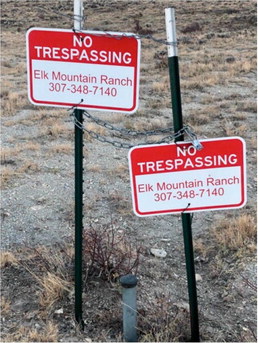Montana Proponents For Public Access, Landowners, Await Implications Of Wyoming Lawsuit


Outcome of pending corner-crossing case could impact who has the right to use — or lock up — more than eight million acres across the West
(Editor’s Note: When four hunters used a specially constructed ladder to step from one corner of public land in southern Wyoming to another, the ripples from that decision were initially small but have since ignited an impassioned debate that could open — or unequivocally restrict — access to more than eight million acres of public land across the West. In a three-part series, Montana Free Press will explore “corner- crossing” and what it might mean for public access in Montana. This is the first installment of that series.)
The four hunters from Missouri had come prepared to Elk Mountain, Wyoming. Three of them had hunted in the area the previous year, finding its high elevation, fir-dotted slopes and aspen groves ideal for elk and deer. The hunters knew, too, that the odds were decent that they’d encounter pushback from the manager of the Elk Mountain Ranch, even though they’d come to hunt the sections of public land intermixed in a checkerboard pattern with the 22,000-acre ranch.
In anticipation of such difficulties, they’d brought a mapping app that displays property boundaries and the user’s location relative to them. One of the hunters also brought a lightweight, articulating ladder he’d built just for the occasion, so the hunters could cross from one corner of the Bureau of Land Management land to another — each open to the public — without stepping on the private property of the Elk Mountain Ranch.
Neitherthemappingappnor the ladder spared them from the ranch manager’s ire, which they’d first experienced when they hunted the south-central Wyoming area the year prior. They later reported that they encountered “an abhorrent amount of hunter harassment” from Elk Mountain Ranch employees, who swore at them, “stalked” them and scared off the game they were pursuing with an ATV.
After the Elk Mountain Ranch manager’s initial deterrence proved unsuccessful, he called the Wyoming Game and Fish Department. The department declined to intervene, arguing that the Wyoming attorney general had deemed corner-crossing like the Missouri hunters were attempting to be legal. Undeterred, the manager next tried the local sheriff, again without the desired result. The ranch manager finally garnered traction with the local prosecuting attorney, who told the Carbon County sheriff to issue citations and directed the Wyoming Game and Fish Department to tell the hunters to leave and not enter the “corner-locked” public land in question again.
Elk Mountain Ranch’s prosecutor-assisted victory, though, was short-lived: In April 2022, a jury acquitted the four hunters of criminal trespassing, a misdemeanor that carries a penalty of up to six months in jail and a $750 fine.
That was not the end of the story, though, for Fred Eshelman, the South Carolina- based founder of a multi-billion-dollar prescription drug company who maintains that the BLM considered corner-crossing to be illegal when he purchased Elk Mountain Ranch in 2005. Even before the jury verdict arrived, Eshelman filed a civil trespassing lawsuit against the four hunters, arguing that they had violated his private property rights by entering the airspace above his land. Eshelman sought more than $7 million, a figure he arrived at using real estate agents’ estimated devaluation of Elk Mountain Ranch should he lose exclusive access to the BLM land intermixed with his ranch.
Eshelman was thwarted there, too. Last May, U.S. District Judge Scott Skavdahl ruled in favor of the hunters, finding that their “temporary incursions into the airspace at the corners of Plaintiffs’ land does not constitute trespassing” unless there is evidence of “actual damages.” Skavdahl found no such damages and asserted that a century-old law, the Unlawful Enclosures Act, bars landowners like Eshelman from obstructing public access across corners like the ones the hunters used their ladder to step over.
“The court finds that where a person corner-crosses on foot within the checkerboard from public land to public land without touching the surface of private land and without damaging private property, there is no liability for trespass,” Skavdahl wrote. “In this way, the private landowner is entitled to protect privately owned land from intrusion to the surface and privately owned property from damage while the public is entitled its reasonable way of passage to access public land.”
In the days following Skavdahl’s ruling, advocates for access, landowner groups and public agencies in other states — including the Montana Fish, Wildlife and Parks — weighed in on the legality of corner-crossing, an issue that the hunters’ attorney described as “clear as mud” during the earlier criminal trespassing trial.
Eshmelman appealed the ruling to the 10th U.S. Circuit Court of Appeals. Although Montana is not in the same appellate circuit as Wyoming, the case is being closely watched by stakeholders here, who wonder if the eventual decision will have “persuasive authority” with judges in other circuits, including ours. As in Wyoming, land managers in Montana are grappling with the legacy of Congress’ century- and-a-half-old decision to grant railroads every-othersquare- mile section of land along new rail lines. Those incentives to the railroads spurred construction across the West, but when those same railroads later sold off the gifted sections, it fostered the checkerboard pattern that continues today to vex land managers, recreationists and landowners.
United Property Owners of Montana, a group representing the interests of large landowners in property and wildlife management disputes, in November asked the circuit court to rule in favor of the company that owns Elk Mountain Ranch. In its amicus brief with the court, UPOM argues that although it finds the issues to be “settled law,” the court should not “lose sight of the broader implications of corner-crossing.” “Currently, checkerboard federal lands act as de facto wildlife preserves that receive little or no hunting pressure,” the brief reads. “If affirmed, the district court’s decision will likely result in thousands of hunters and other recreationalists accessing millions of acres of federal land that were previously protected.”
The enforcement of trespassing violations relating to corner-crossing has generally been a light lift for the federal government, the filing continues, “since very few people actually did so.”
A shift in the status quo would put an increased burden on the federal government to “monitor, protect, and police millions of acres of its property,” according to UPOM’s filing, which argues that issues with poaching, littering, fires and other crimes on previously inaccessible federal land will inevitably rise.
UPOM policy director Chuck Denowh told Montana Free Press that his group weighed in on the debate because it’s “worried about the precedent that it sets, both legally and in the minds of the public.”
“There’s been this misconception spread that corner- trespassing is legal in some areas or is unsettled law, and we don’t feel that’s the case,” Denowh said. “We think it’s very clear that trespassing across any amount of private property is illegal and a taking of that property if the government allows it to happen.”
UPOM isn’t the only Montana- based group keeping tabs on the appeal to the 10th Circuit. The Montana chapter of Backcountry Hunters and Anglers — a sister group to a Wyoming chapter that helped raise money for the hunters’ legal defense — cheered Skavdahl’s ruling and balked at Montana Fish, Wildlife and Parks’ assertion in June that corner-crossing “remains unlawful in Montana.”
“If there is a corner of public land touching another corner of public land, that should be legally accessible,” John Sullivan, chair of the Montana chapter of BHA, told MTFP. “No one has exclusive access to public land unless it’s completely landlocked.”
In a June 2023 online post, BHA argued that FWP had not treated the practice as unequivocally illegal until the department’s recent course reversal. In 2001, for example, a department memo said it “should be the local county attorney who decides whether or not to file charges.”
BHA’s position is that the public should have access to corner-locked land — but also be prepared to encounter law enforcement officials with different views.
“We can only tell you to proceed at your own risk, carefully and respectfully,” BHA’s post concluded.
If there’s any doubt as to how widely the ladder-wielding hunters’ fall 2021 hunt has rippled, Skavdahl’s ruling provides a clue. The federal judge devoted one of his order’s final paragraphs to “one final matter” — that of emails and phone calls from members of the public seeking to steer his decision.
“Attempts by a person or entity not a party to a lawsuit to influence or persuade a court of law’s decision are improper,” he wrote. “The founders of the United States sought to insulate the Judicial branch of government from public opinion so judges could apply and be influenced only by the law, not by popular opinion or polling. … To the extent this Court’s determination of the law is believed to be erroneous, the remedy is for a party to take an appeal.”
That appeal is still winding through the 10th Circuit. A variety of organizations representing agricultural, recreational and conservation interests have filed amicus briefs with the court, which could either schedule a hearing or rule based on the filings.
(The next installment of this series will be published in an upcoming edition of the Northern Plains Independent. In it, MTFP will explore why Montana lacks a “test case” on the legality of corner-crossing and why legislators’ attempts to bring clarity to Montana law have floundered.)
~~~~~~~~~~~~~~~~~~~~~~~~~~~~~~~~~~~~~~~~~~~~~~~~ “If there is a corner of public land touching another corner of public land, that should be legally accessible … No one has exclusive access to public land unless it’s completely landlocked.”
JOHN SULLIVAN, CHAIR OF THE MONTANA CHAPTER OF BACKCOUNTRY HUNTERS AND ANGLERS
~~~~~~~~~~~~~~~~~~~~~~~~~~~~~~~~~~~~~~~~~~~~~~~~ ~~~~~~~~~~~~~~~~~~~~~~~~~~~~~~~~~~~~~~~~~~~~~~~~ “We think it’s very clear that trespassing across any amount of private property is illegal and a taking of that property if the government allows it to happen.”
UNITED PROPERTY OWNERS OF MONTANA POLICY DIRECTORY CHUCK DENOWH ~~~~~~~~~~~~~~~~~~~~~~~~~~~~~~~~~~~~~~~~~~~~~~~~




